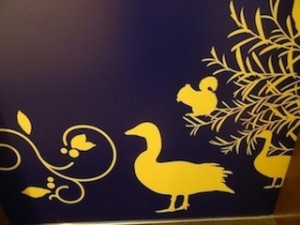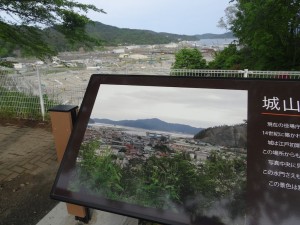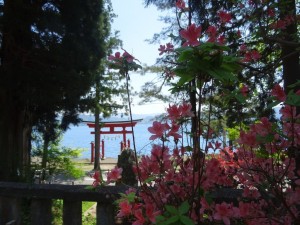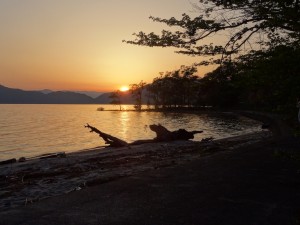I’ve never quite seen a hotel door like the one that greeted us in Kamaishi. Golden ducks on a black laquer pond. Maybe its stylish beauty was to compensate for the plain Jane of the city, with its industrial history of iron and steel production. Maybe we had the honeymoon suite by accident. More likely (in retrospect) a premonition.
A premonition that (somehow) luminous birds on dark water would transmute into happy children paddling in a golden lake.
We were in Japan in May. Akii stayed a month. I was there just two weeks, and with only one thing on my mind: to meet Chiaki and apologise for failing to set up an imagined project to bring schoolchildren from Otsuchi to Scotland for a welcome break and some English (Scottish) language immersion.
Otsuchi, a costal town just half an hour from Kamaishi, in the north-east region known as Tohoku, lost 1000 of its inhabitants to the tsunami of March 3, 2011. This included half its city office staff; not surprisingly it took this shattered community a long time to get anywhere near back on its feet.
I became involved with Otsuchi at long distance after 3/11. Having collected coats and blankets for survivors and evacuees, I networked to try and find a way in which they could be distributed up north. Which is how I found Chiaki.
Takahashi Chiaki (family name first in the Japanese way) – based in Morioka City, Iwate Preffecture, and working as an English teacher so enabled to communicate internationally – had established an amazingly efficient volunteer organisation: Iwate Relief. It was she who drove my boxes to Otsuchi, and saw the contents distributed.
Halfway through Level 4 of DOTWW at the time of the disaster, it was clear after we reconvened three weeks later that everyone’s attention had been redirected. Alena was preparing leave Tokyo as a “radiation refugee” and move south to Wakayama Prefecture. Jacinta went on to set up (first by Facebook, later as a website) Embrace Transition, to help people cope with change. Jeffrey began writing songs about Fukushima’s unfolding tragedy, and produced a CD to help raise funds. James joined them on a trip to Otsuchi, to distribute gifts, as donated through the Share Your Christmas with Tohoku Campaign.
We had dreamed up this project over a rather drunken dinner one summer evening; good to report that it’s still going strong, with people all over the world sending gifts to share each year-end.
Eighteen months later, preparing to leave Japan for Scotland, I contacted Chiaki again. Did she know anyone who might find my sewing machine useful? Yes, she replied, a woman with children who having lost her home to the floodwaters was desperate to support her children. So off it went…
The world assumes four years on that all is well with Japan; it has “recovered”. But believe me, in those parts that have been conveniently forgotten by the media (as instructed by government), the need remains enormous. Communities have not only been battered, but subsequently abused, with Otsuchi providing a clear example.
Chiaki had gone to a lot of trouble to make our visit clear and instructive. After picking us up from the hotel, she drove 30 minutes from Kamaishi to the kindergarten in Otsuchi, where she teaches English to the little ones. I use the word “teach” loosely; rather she is familiarising the under sixes to hearing a different language and making them comfortable with using some simple phrases. And how beautifully she does it: in heavily accented American-English and using American-English expressions, true, but to which they respond with great enthusiasm and joy.
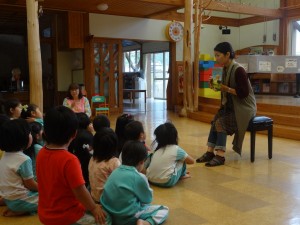
Chiaki Takahashi donates every Friday to the new generation in Otsuchi. In the morning she teaches at the kindergarten, accustoming the children to English
There was no fear of me either. In 1986, when I first arrived in Japan, the large majority of children ran a mile!
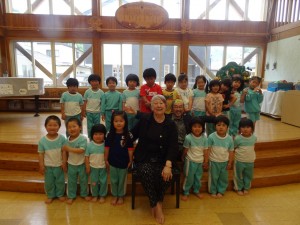
Akii and I in the required line up…chizu (cheese). As to the sweetness of the toddlers, most – but not all – born since 3/11, what can one say but Ahhhhhhhh…
The owner and founder of the kindergarten came to talk with us, showed us photographs of the damage caused that terrible afternoon. The tidal wave, funnelled by the valley, swept right into the building up to ceiling height. Fortunately staff had taken all the children to safety, barring one, whose mother had come to pick her up by car before turning back into the town to collect her mother. All were swept away.
Much affected by what we had seen and heard, we went for lunch in the one restaurant back in service. It was here I explained to Chiaki why the project I had hoped to set up in Scotland had not manifested.
No matter, she insisted. “I have another idea that maybe you can help with…”
Which is how the idea of the Otsuchi Summer English Camp was born.
With the fishing industry decimated, the canning factory gone, and the iron and steel industry in Kamaishi reduced, prospects for the next generation are limited. Chiaki feels that with a wider exposure to the outside world and a confidence in English, they will have a better chance in life.
This is why she donates every Friday to the children of the town, and with nearing half a decade behind her, will continue for another five years. By this time, she will have seen at least one generation through from kindergarten entry level to age 15/16 when they move to high school.
We met many of these older children in in the local community centre, where they attend voluntarily extracurricular English language classes through the afternoon. They had all made us drawings of welcome, shook our hands with sweetly assured confidence and told us their names.
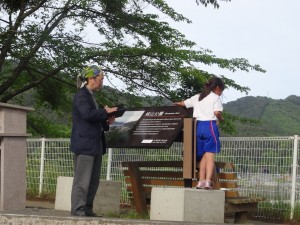
Akii chatting with one of the elementary school-age children that Chiaki teaches on Friday afternoons, as they gaze down over Otsuchi
The community facility is the highest building in Otsuchi. Yet residents had been told to make the temple below the town’s main evacuation point in any emergency. Many of those who gathered there lost their lives. Survivors climbed up through the graveyard and huddled in the main hall, where they first cut down the long floor to ceiling length curtains and then sectioned them for wrapping up the children overnight. It was pitch black inside and out, snowing, and very very cold.
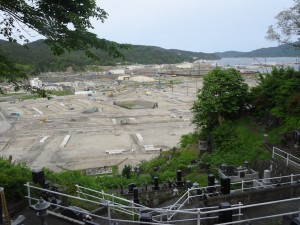
The graveyard, from which survivors climbed up to the community hall. Beyond, the construction industry having a financial field day…
Those ragged curtains acted as a traumatic reminder of that time for all students and staff when school resumed. Now they have been replaced, thanks to yet another of Chiaki’s efforts: the Curtains of Love project, with major private and corporate funding, and a large contribution from Germany.
Just last weekend, on July 29, three months after our visit, a group of children from these classes, aged between 7 and 11, travelled by bus and train to Tazawako, a beautiful pristine lake in Akita Prefecture to the northwest. They stayed in the pension That Sounds Good, ran free (something they cannot do where they are living) in nature, cycled, enjoyed craft projects and began to learn to swim. Most Otsuchi children are terrified of the sea, never go to their own beaches.
As to the English immersion aspect, English-born Japanophile Kevin Dodd, who has been much involved with Otsuchi from the start, travelled from Paris where he currently based to assist. Also my friend of many years, Heather Willson, from Kamakura, south of Yokohama, promised to leave her fluent Japanese language facility at home.
We know that those Otsuchi parents who were reluctant to allow their children to travel so far, out of sight, have been watching this project with interest. With our intention to make this an annual event, a much larger group is expected next year. Needless to say, more helpers will be required; more funding also.
But at least we have a year. To have organised the weekend camp in such a short time, is miraculous. But then Chiaki is a bit of a miracle.
While in Otsuchi, she took us to meet a retiree whose house had survived while all those around were either lost or severely damaged. Initially he worked tirelessly to help his neighbours, but slowly they began to turn against him, angry at the apparent unfairness of their situation compared to his own. He has suffered innumerable breakdowns as a result, still suffering survivor’s guilt.
We met another friend of Chiaki’s who had lost his home and his car, yet is still having to pay the loans of them… He barely survives, handling his depression by escaping into traditional Japanese dance dressed as a woman.
Chiaki says that the level of mental health is low among just about everyone in the region. Everyone has problems.
Soon after the tsunami, with the population in a state of shock, the vultures moved in: real estaters from the capital, who bought or simply moved in on land from families who had no proof of ownership over generations… Now the construction industry is having a field day, laying down infrastructure and creating piles of sand which, it is reported, will be “glued together”. You can be pretty sure that the families in temporary facilities will not be able to afford to buy the houses to be built on such structures.
Chiaki is very angry. But channels this energy into helping as best she can. Which is all any of us can do, right?
I will finish with a few photos from our own stay at Tazawako…
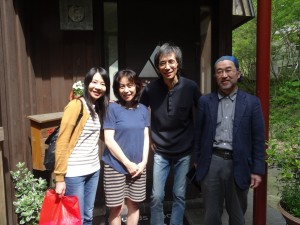
Kathy Wu, the owners of the pension That Sounds Good, and Akii, on our last morning. Kathy, who was travelling alone from Hong Kong, is now an active supporter of Otsuchi English Club events…
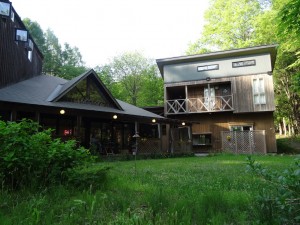
The pension That Sounds Good, on the lakeshore of Tazawako that hosted children from Otsuchi at the end of July
And will post photos of the camp as they come through to me from those involved. By next week, promise.

